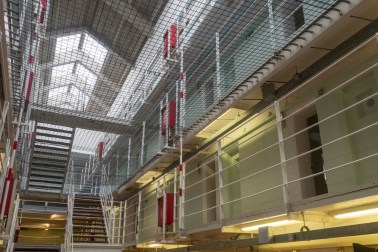War with Iraq, previously a nebulous prospect, has come sharply into focus in the first two weeks of this year. Much has been resolved. In Washington Donald Rumsfeld has lost the argument. His original idea that a light and fast raiding party would, with the aid of an uprising from grateful Kurds and Shiites, be enough to destroy Saddam has been squashed by US generals. Nothing is to be left to chance. It is now clear that a more ponderous force of perhaps 250,000 will be brought to bear.
The British role is also clearer: it will be much less important than at one time thought. The involvement of the British army will be as militarily negligible as it is politically significant. This is an arrangement that will suit Tony Blair as much as it does the US military. It is frustrating, however, for British soldiers. The 7th Army Brigade has been exercising on the north German plain for three months, impatient for the order to go to war. This has not come. For six months the British army has known that this conflict was imminent. But the generals have been left without time to make sensible preparations. Indeed, unless they are deployed very soon indeed, British troops fear they will arrive too late for the battle proper. Instead they will be entrusted with the clean-up and, later still, peacekeeping duties which will probably prove much more dangerous than the battle itself.
Some soldiers judge that this was the Prime Minister’s idea all along. They take the view that their job has been made more difficult in order to lighten the government’s difficulties with its mutinous left-wing element. Military experts note, too, that the fleet’s laborious progress towards the Gulf is testament to the way the government has neglected the armed forces. Our ships travelling east scandalously lack support aircraft. This is the indirect effect of the retirement last year of the assault ship HMS Fearless. Her successor, HMS Albion, is not yet in commission. This means that the Ark Royal (the other two carriers are being refitted) carries a complement of helicopters for assault purposes, but no fixed-wing aircraft.
But the British army is not the problem for the Prime Minister. Soldiers are trained to take orders, however uncongenial. This is not so unambiguously the case with the Labour party. Tony Blair has never been as exposed and detached from his own Cabinet, his MPs and the country at large as he is today. This is especially the case since Monday, when the Prime Minister made plain at a Downing Street press conference that he is determined to go ahead with war even without United Nations backing.
On this point Tony Blair enjoys the backing of Iain Duncan Smith and the Tory party. Duncan Smith has been unfairly criticised for his on the whole faithful support for the Downing Street line throughout this crisis. But he has simply adopted the posture of all Tory oppositions when a progressive government has led the country into war. In 1914 Bonar Law saw it as his duty to stiffen Asquith’s spine. In 1950 Winston Churchill backed Clem Attlee over Korea, while skilfully fermenting suspicion between the Labour government and its left wing, notably Aneurin Bevan. Duncan Smith is pursuing the same kind of tactic today. Tory support for the Downing Street line is as unwelcome on the Labour backbenches as it is unsettling within the government.
Several Cabinet ministers – including the Foreign Secretary Jack Straw (reflecting Foreign Office alarm that the war will have a calamitous effect in the Middle East), the Health Secretary Alan Milburn, Robin Cook and Clare Short – have argued that the war must have the unequivocal backing of the United Nations. Only the Defence Secretary Geoff Hoon and John Reid, the party chairman, seem to share the view of the Prime Minister and President Bush that United Nations opposition should, however reluctantly, be over-ridden. But the most important voice within government against the war may not turn out to be a Cabinet minister at all. It may be the Attorney General, Lord Goldsmith. It is thought that Goldsmith has already raised the possibility that the war may be, in certain circumstances, illegal. It is far from certain that his guidance will allow Tony Blair to follow George Bush into war, if the two leaders insist on doing so without a second United Nations resolution beyond the one already extracted, through gritted teeth, from the Security Council last autumn.
The primary obligation of an attorney general, as Tony Blair might be uncomfortably aware, is not to the government of the day. Fifty years ago Sir Reginald Manningham Buller, a previous occupant of the job and the father of Eliza Manningham Buller, now the head of MI5, put it like this: ‘He exercises the majority of his functions in a quasi-judicial manner and without regard to political considerations of any kind; he represents the interests of the general public as distinct from the interests of any government department which may be involved.’
This puts any attorney general in a more sharply different relationship with the prime minister than any other member of the government. John Morris, who was attorney general during the Kosovan conflict, drove the War Cabinet mad by the scrupulous way he (quite properly) insisted on investigating air targets in advance. He was sacked shortly afterwards. Goldsmith has at all times resisted attempts to extract from him the nature of the confidential guidance he gives to the Prime Minister. Whitehall sources insist that last autumn he provided the unwelcome news that going to war to secure regime-change in Iraq would be illegal – an important reason why British ministers have been slow to follow President Bush down that path.
Now those same sources repeat that Peter Goldsmith is stressing the need for a second resolution. Goldsmith finds himself closer in agreement with the finding of the foreign affairs select committee – that Resolution 1441 would not provide unambiguous authorisation for military action, were Iraq to fail to comply with its provisions – than to last year’s gung-ho assertions from the Defence Secretary Geoff Hoon that no resolutions of any kind would be required.
Goldsmith is not yet in a position to give his final advice. We do not know yet what the weapons inspectors may or may not discover in Iraq. No one can be sure how amenable fellow members of the Security Council may be to a fresh resolution. It is not impossible that Saddam, cut off and surrounded on all sides, may be forced out without recourse to war. Many uncertainties lie ahead; but one of them is whether the government’s own law officer will allow Mr Blair to head off into the sunset with George Bush.





Comments